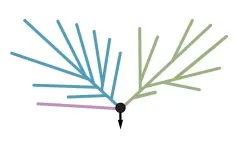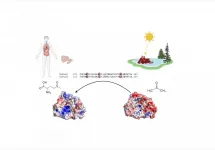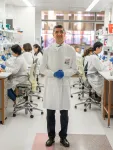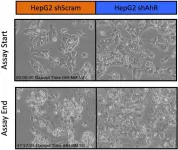(Press-News.org) Bacteria that move around live on the edge. All the time. Their success, be it in finding nutrients, fending off predators or multiplying depends on how efficiently they navigate through their confining microscopic habitats. Whether these habitats are in animal or plant tissues, in waste, or in other materials. In a recent paper published in PNAS, a team of researchers led by McGill University, has described a number of factors affecting how five, very different, species of bacteria search and navigate through varied microfluidic environments which pose various decisional challenges. This increased understanding of the bacterial space searching and navigational 'strategies' has implications for everything from diagnosing infectious diseases and maintaining human health, to the development of devices for everything from genomics to bio computation, as well as for a wide range of agricultural, industrial, and environmental activities.
The researchers filmed the movements of five species of bacteria navigating through a range of microfluidic settings - from fairly open spaces (plazas) to complicated meandering channels. This allowed them to better understand the factors involved in the navigational 'strategies' of bacteria as they search for available space.
See END
Rules of the road: the navigational 'strategies' of bacteria in motion
Wide ranging implications -- from the health of the environment to the spread of infectious diseases
2021-05-11
ELSE PRESS RELEASES FROM THIS DATE:
Patient expectations, doctors' prescribing habits, and antimicrobial resistance
2021-05-11
Antibiotics: Patient Expectations and Doctors' Prescribing Habits May Contribute to Antimicrobial Resistance
Inappropriate antibiotic prescribing for upper respiratory tract infections contributes to antibiotic resistance, making some bacterial infections difficult to treat. This often leads to higher medical costs, prolonged hospital stays and increased mortality. Still, many physicians report prescribing antibiotics at their patients' request. To address patients' expectations for antibiotic prescribing for URTIs, researchers conducted an experiment in which study participants were assigned brief educational videos to watch on a tablet immediately prior to their appointment.
The authors randomized patients into three groups - one that viewed a presentation about ...
Artificial Intelligence and drones will help pin down Sosnovsky's hogweed
2021-05-11
Skoltech scientists have created a new monitoring system for agricultural applications that performs real-time image segmentation on board the drone to identify hogweed. The research was published in a high-profile journal, IEEE Transactions on Computers.
Sosnovsky's hogweed is equally hazardous for farming, local ecosystems, and human health. Direct contact with human skin, especially if aggravated by exposure to the Sun, causes severe burns that require continuous medical care and take weeks to heal. The rampant spread of Sosnovsky's hogweed has become a real environmental disaster that extends across the whole of ...
Study examines connection between oral and general health in patients with diabetes
2021-05-11
Individuals with diabetes are at greater risk of developing oral health issues, like gum disease, yet care for these linked health issues are usually disconnected, split between primary care and dental care. A research team from the University of Amsterdam developed an intervention that provided primary care-based oral health information and dental referrals for patients with diabetes. In a cluster randomized controlled trial, 764 patients from 24 primary care practices received either the oral health support or standard primary care. Participants were asked to rate their oral health quality of life, as well as their general health and any oral health complaints, at the start and end of the study. Analysis showed that individuals who received the primary care-based oral health support ...
Low-temperature crystallization of phase-pure α-formamidinium lead iodide enabled by study
2021-05-11
Though different fabrication approaches exist, two-step deposition is one of the main experimental techniques now used to make efficient, stable PSCs, especially on the industrial scale. The process involves first depositing lead iodide (PbI2) and then adding halide salts of monovalent cations such as methylammonium iodide (MAI) and formamidinium iodide (FAI) to convert it to perovskite.
While this two-step deposition is better than other options, it is difficult to maintain reproducible high performance and long-term stability when scaling up, mostly because of a lack ...
This stinks: New research finds sense of smell and pneumonia linked
2021-05-11
EAST LANSING, Mich. - An acute loss of smell is one of the most common symptoms of COVID-19, but for two decades it has been linked to other maladies among them Parkinson's disease and dementia. Now, a poor sense of smell may signify a higher risk of pneumonia in older adults, says a team of Michigan State University researchers.
"About a quarter of adults 65 years or older have a poor sense of smell," said Honglei Chen, a professor in the Department of Epidemiology and Biostatistics within MSU's College of Human Medicine. "Unlike vision or hearing impairment, this sensory deficit has been largely neglected; more than two-thirds of people with a poor sense of smell do not know they have it."
In a first-of-its-kind study, Chen and his team found a possible link ...
World's fastest information-fuelled engine designed by SFU researchers
2021-05-11
Simon Fraser University researchers have designed a remarkably fast engine that taps into a new kind of fuel -- information.
The development of this engine, which converts the random jiggling of a microscopic particle into stored energy, is outlined in research published this week in the END ...
Rooting the bacterial tree of life
2021-05-11
Scientists now better understand early bacterial evolution, thanks to new research featuring University of Queensland researchers.
Bacteria comprise a very diverse domain of single-celled organisms that are thought to have evolved from a common ancestor that lived more than three billion years ago.
Professor Phil Hugenholtz, from the Australian Centre for Ecogenomics in UQ's School of Chemistry and Molecular Biosciences, said the root of the bacterial tree, which would reveal the nature of the last common ancestor, is not agreed upon.
"There's great debate about the root of this bacterial tree of life and indeed whether bacterial evolution should even be described as a tree has been contested," Professor ...
Tiny amino acid differences can lead to dramatically different enzymes
2021-05-11
Just a few changes to an enzyme's amino acids can be enough to dramatically change its function, enabling microbes to inhabit wildly different environments.
University of Queensland microbiologist Associate Professor Ulrike Kappler, led by an international team of researchers, made this discovery when investigating how Haemophilus influenzae bacteria colonise the human respiratory system.
"This disease-causing bacterium is supremely adapted to living in humans, so much so that they cannot survive anywhere else," Dr Kappler said.
"It turns out that one enzyme, MtsZ, is the key player in this adaptation.
"But, surprisingly, ...
UQ research finds new way to reduce scarring
2021-05-11
Researchers have been able to reduce scarring by blocking part of the healing process in research that could make a significant difference for burns and other trauma patients.
University of Queensland Professor Kiarash Khosrotehrani said scars had been reduced by targeting the gene that instructs stem cells to form them in an animal study.
"The body's natural response to trauma is to make plenty of blood vessels to take oxygen and nutrients to the wound to repair it," Professor Khosrotehrani said.
"Once the wound has closed, many of these blood vessels become fibroblast cells which produce the collagens forming the hard materials found in scar tissue.
"We found that vascular stem cells determined whether a blood vessel was retained or gave rise to scar material ...
Oregon State researchers discover new class of cancer fighting compounds
2021-05-11
CORVALLIS, Ore. - A team of Oregon State University scientists has discovered a new class of anti-cancer compounds that effectively kill liver and breast cancer cells.
The findings, recently published in the journal Apoptosis, describe the discovery and characterization of compounds, designated as Select Modulators of AhR-regulated Transcription (SMAhRTs).
Edmond Francis O'Donnell III and a team of OSU researchers conducted the research in the laboratory of Siva Kolluri, a professor of cancer research at Oregon State. They also identified the aryl hydrocarbon receptor (AhR) as a new molecular target ...
LAST 30 PRESS RELEASES:
Middle-aged men are most vulnerable to faster aging due to ‘forever chemicals’
Starving cancer: Nutrient deprivation effects on synovial sarcoma
Speaking from the heart: Study identifies key concerns of parenting with an early-onset cardiovascular condition
From the Late Bronze Age to today - Old Irish Goat carries 3,000 years of Irish history
Emerging class of antibiotics to tackle global tuberculosis crisis
Researchers create distortion-resistant energy materials to improve lithium-ion batteries
Scientists create the most detailed molecular map to date of the developing Down syndrome brain
Nutrient uptake gets to the root of roots
Aspirin not a quick fix for preventing bowel cancer
HPV vaccination provides “sustained protection” against cervical cancer
Many post-authorization studies fail to comply with public disclosure rules
GLP-1 drugs combined with healthy lifestyle habits linked with reduced cardiovascular risk among diabetes patients
Solved: New analysis of Apollo Moon samples finally settles debate about lunar magnetic field
University of Birmingham to host national computing center
Play nicely: Children who are not friends connect better through play when given a goal
Surviving the extreme temperatures of the climate crisis calls for a revolution in home and building design
The wild can be ‘death trap’ for rescued animals
New research: Nighttime road traffic noise stresses the heart and blood vessels
Meningococcal B vaccination does not reduce gonorrhoea, trial results show
AAO-HNSF awarded grant to advance age-friendly care in otolaryngology through national initiative
Eight years running: Newsweek names Mayo Clinic ‘World’s Best Hospital’
Coffee waste turned into clean air solution: researchers develop sustainable catalyst to remove toxic hydrogen sulfide
Scientists uncover how engineered biochar and microbes work together to boost plant-based cleanup of cadmium-polluted soils
Engineered biochar could unlock more effective and scalable solutions for soil and water pollution
Differing immune responses in infants may explain increased severity of RSV over SARS-CoV-2
The invisible hand of climate change: How extreme heat dictates who is born
Surprising culprit leads to chronic rejection of transplanted lungs, hearts
Study explains how ketogenic diets prevent seizures
New approach to qualifying nuclear reactor components rolling out this year
U.S. medical care is improving, but cost and health differ depending on disease
[Press-News.org] Rules of the road: the navigational 'strategies' of bacteria in motionWide ranging implications -- from the health of the environment to the spread of infectious diseases






